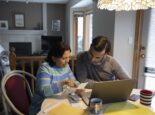A more equitable energy future for the South
The South’s high energy burden
Southern households pay some of the highest monthly electric bills nationwide, forcing some families to choose between keeping the lights on or paying for groceries, medicine, and other essential needs.
Many families across our region experience disproportionate energy burdens—the percentage of monthly income spent on energy costs. Households of color, senior citizens, and residents earning a lower or fixed income are often hit hardest by high electric bills.
Customers unable to keep up with monthly electric bills frequently face having their electricity shut off—which can require paying a deposit on top of hefty fees, repayment of past due bills, and adhering to a strict payment plan—before they can get power restored. Those who cannot afford to pay additional fees further risk hurting their credit scores, which can negatively affect employability and make it even more difficult to pay for basic living necessities.
Solutions for real bill relief
Rooftop and community solar and energy efficiency programs can help to alleviate high energy burdens by empowering customers to control their energy usage and save on monthly bills. Because these clean energy resources reduce the need to generate electricity, they help all customers to avoid paying for expensive, unnecessary power plants in the form of higher rates for decades to come.
However, many households in our region lack access to these programs, which would give more customers the ability to better manage their energy use and save money on electric bills, while driving down electricity costs across the board for all users.
To date, decisions about our energy options have often been driven by utilities’ incentive to build and profit from large, expensive power plants, driving up costs for customers while leaving energy-saving measures on the table.
While some utilities have made moderate improvements to new and existing solar and efficiency programs—including making them more accessible to families earning a lower or fixed income and increasing program budgets—these incremental steps forward alone do not address the broader scope of the energy burden problem.
The emergence of more leasing options for rooftop solar panels—opening new avenues for households that cannot afford the upfront costs—and inclusive financing options for money-saving energy efficiency upgrades are promising steps. But we need to expand these initiatives to extend the benefits of a clean energy transition to households that need it most.
We need an energy future that’s good for all of us, not just for powerful utilities. Energy planners must make decisions that put our interests first.
Nathaniel Smith, founder and chief equity officer at Partnership for Southern Equity
Charting a new, more equitable energy future
We are striving to set the South on a far more equitable and cost-effective course—one that places greater reliance on smart, steady investments in solar and energy efficiency, creates better access to bill relief programs for customers who need it most, and ensures affordable electric bills.
Along with our partners, the Southern Environmental Law Center’s legislative, policy, and regulatory commission advocacy has resulted in marked improvements in utility solar and energy efficiency offerings. These efforts have resulted in clean energy victories, including the first carve-outs for community solar programs in our region for South Carolina customers earning a lower income, securing a settlement in North Carolina to help customers finance energy efficiency upgrades, and expanding solar offerings and energy savings targets and budgets for efficiency programs in Georgia.
We have also engaged with community advocates and mapping work to better understand and illustrate the inequitable energy burdens that many households in our region face, and to more effectively advocate for programs that provide bill relief.
We will continue our work to further shift utilities toward recognizing energy efficiency as a priority resource to meet current and future energy needs more cost effectively while reducing carbon emissions. While our region has made significant progress with utility scale solar, we still have a big opportunity to ramp up rooftop and community scale solar. SELC remains committed to pushing for fair policies for Southern communities to go solar, both at home and work.



